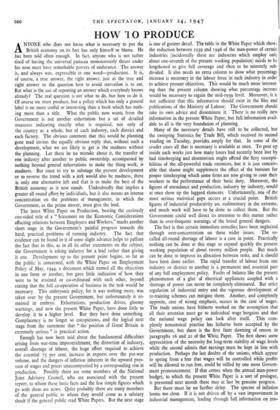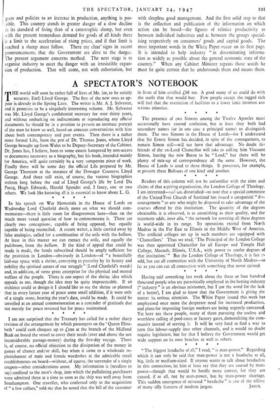HOW 1O PRODUCE
ANYONE who does not know what is necessary to put the British economy on its feet has only himself to blame. He has been told often enough. In fact, anyone who is not rather tired of having the universal panacea monotonously thrust under his nose must have remarkable powers of endurance. The answer is, and always was, expressible in one word—production. It is, of course, a true answer, the right answer, just as the true and right answer to the question how to avoid starvation is to eat. But what is the use of repeating an answer which everybody knows already? The real question is not what to do, but how to do it. Of course we must produce, but a policy which has only a general label is no more useful or interesting than a book which has noth- ing more than a title. What the public now wants from the Government is not another exhortation but a set of detailed measures indicating exactly what is required, not only of the country as a whole, but of each industry, each district and each factory. The obvious comment that this would be planning gone mad invites the equally obvious reply that, without such a development, what we are likely tc get is the madness without the planning. Let there be no mistake about it, the transfer of one industry after another to public ownership, accompanied by nothing beyond general exhortations to make the thing work, is madness. But since to try to sabotage the present development or to reverse the trend with a jerk would also be madness, there is only one alternative left and that is to make the best of the British economy as it now stands. Undoubtedly that implies a greater all round effort by individuals, but it also means an intense concentration on the problems of management, in which the Government, as the prime mover, must give the lead.
The latest White Paper on Production, bearing the curiously one-sided title of a " Statement on the Economic Considerations affecting relations between Employers and Workers," marks another short stage in the Government's painful progress towards the hard, practical problems of running industry. The fact that evidence can be found in it of some slight advance helps to palliate the fact that in this, as in all its other statements on the subject, the Government is asking industry for a lead rather than giving it one. Development up to the present point begins, so far as the public is concerned, with the White Paper on Employment Policy of May, 1944, a document which named all the objectives in one form or another, but gave little indication of how they were to be attained or co-ordinated with each other, beyond stating that the full co-operation of business in the task would be necessary. This embryonic policy, for it was nothing more, was taken over by the present Government, but unfortunately it re- mained in embryo. Exhortations, production drives, gloomy warnings, and now the present White Paper, have done little to develop it to a higher level. But they have done something. Complacency is no longer so conspicuous, and the logical next stage from the statement that " the position of Great Britain is extremely serious " is practical action.
Enough has now been said about the fundamental difficulties arising from war-time impoverishment, the distortion of industry, overall shortage of labour, the huge effort required to achieve the essential 75 per cent. increase in exports over the pre-war volume, and the dangers of inflation inherent in the upward pres- sure of wages and prices unaccompanied by a corresponding rise in production. Possibly there are some members of the National Joint Advisory Council, who are associated with the present report, to whom these basic facts and the few simple figures which go with them are news. Quite probably there are many members of the general public to whom they would come as a salutary shock if the general public read White Papers. But the next stage is one of greater detail. The table in the White Paper which shows the reduction between 1939 and 1946 of the manpower of certain industries (incidentally these are industries which employ only about one-seventh of the present working population) needs to be lengthened to give full coverage and then to be minutely sub- divided. It also needs an extra column to show what percentage increase is necessary in the labour force in each industry in order to achieve present objectives. This would be much more interest- ing than the present column showing what percentage increase would be necessary to regain the mid-1939 level. Moreover, it is not sufficient that this information should exist in the files and publications of the Ministry of Labour. The Government should take its own advice and disseminate it. There is no really new information in the present White Paper, but full information avail- able to all is the very foundation of planning.
Many of the necessary details have still to be collected, but the sweeping , Statistics for Trade Bill, which received its second reading on Tuesday, provides amply for that. In some of the cruder cases all that is necessary is available at once. To post up inside each works just how many hours had recently been lost by bad timekeeping and absenteeism might offend the fiery suscepti- bilities of the all-powerful trade unionists, but it is just conceiv- able that shame might supplement the effect of the bonuses for proper timekeeping which some firms are now giving to coax their workers to the performance of their basic duty. Moreover, the figures of attendance and production, industry by industry; would at once show up the laggard elements. Unfortunately, one of the most serious statistical gaps occurs at a crucial point. British figures of industrial productivity are rudimentary in the extreme, and much work will have to be done to collect them. But the Government could well direct its attention to this matter rather than to over-frequent warnings of the broad general dangers.
The fact is that certain immediate remedies have been neglected through over-concentration on these wider issues. The so- called all-round shortage of labour is a case in point. Practically nothing can be done at this stage to expand quickly the present working population of about twenty million people. But much can be done to improve its allocation between tasks, and it should have been done earlier. The rapid transfer of labour from. one industry or district to another is a permanent and essential part of any full employment policy. Faults of balance like the present phenomenon of a glut of electrical appliances coupled with a shortage of power can never be completely eliminated. But strict regulation of industrial entry and the vigorous development of re-training schemes can mitigate them. Another, and completely opposite, case of wrong emphasis, occurs in the case of wages. The trade unions have hitherto worked on the assumption that all their attention must go to individual wage bargains and that the national wage policy can look after itself. This com- pletely nonsensical practice has hitherto been accepted by the Government, but there is the first faint dawning of reason in paragraphs 16 and 21 of the White Paper. The first shows some appreciation of the necessity for long-term stability of wage levels while the second admits that earnings must be kept in line with production. Perhaps the last doubts of the unions, which appear to spring from a fear that wages will be controlled while profits will be allowed to run free, could be stilled by one more Govern- ment pronouncement. If that comes when the annual man-power budget, to which the present White Paper is a sort of prologue, is presented next month there may at last be genuine progress.
But there must be no further delay. The spectre of inflation looms too close. If it is not driven off by a vast improvement in industrial management, leading through full information on pro- gress and policies to an increase in production, anything is pos- sible. This country stands in greater danger of a slow decline in its standard of living than of a catastrophic slump, but even with the present tremendous demand for goods of all kinds there is a limit to the acceleration of rising prices, and if that limit is reached a slump must follow. There are cleanigns in recent pronouncements that the Government are alive to the danger. The present argument concerns method. The next stage is to organise industry to meet the danger with an irresistible expan- sion of production. That will come, not with exhortation, but with sleepless good management. And the first solid step to that is the collection and publication of the information on which action can be based—the figures of relative productivity as between individual industries and a:, between the groups special- ising respectively on consumers' goods and capital goods. The most important words in the White Paper occur on its first page. It is intended to help industry " in disseminating informa- tion as widely as possible about the general economic state of the country." When any Cabinet Minister repeats those words he must be quite certain that he understands them and means them.



































 Previous page
Previous page